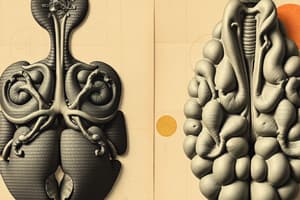Podcast
Questions and Answers
Which hormone is primarily responsible for increasing blood glucose levels in the body?
Which hormone is primarily responsible for increasing blood glucose levels in the body?
- Glucagon (correct)
- Insulin
- Aldosterone
- Cortisol
What is the main function of calcitonin produced by parafollicular C cells?
What is the main function of calcitonin produced by parafollicular C cells?
- Reduce blood calcium levels (correct)
- Regulate blood glucose levels
- Stimulate T cell production
- Increase blood calcium levels
Which gland produces hormones necessary for the development of female secondary sex characteristics?
Which gland produces hormones necessary for the development of female secondary sex characteristics?
- Ovaries (correct)
- Pituitary gland
- Adrenal gland
- Thyroid gland
What type of metabolic disturbance is likely to occur with a deficiency of thyroid hormones?
What type of metabolic disturbance is likely to occur with a deficiency of thyroid hormones?
Which of the following is NOT a secretion of the adrenal cortex?
Which of the following is NOT a secretion of the adrenal cortex?
What is the primary function of hormones secreted by endocrine glands?
What is the primary function of hormones secreted by endocrine glands?
Which gland is primarily involved in the regulation of metabolic functions and growth through its secretions?
Which gland is primarily involved in the regulation of metabolic functions and growth through its secretions?
Which of the following hormones is produced by the anterior lobe of the pituitary gland?
Which of the following hormones is produced by the anterior lobe of the pituitary gland?
What potential disturbances can result from issues within the anterior lobe of the pituitary gland?
What potential disturbances can result from issues within the anterior lobe of the pituitary gland?
Which hormone secreted by the posterior lobe of the pituitary gland is responsible for stimulating uterine contractions?
Which hormone secreted by the posterior lobe of the pituitary gland is responsible for stimulating uterine contractions?
Flashcards are hidden until you start studying
Study Notes
Endocrine Glands Overview
- Glands classified as exocrine (with ducts) and endocrine (without ducts).
- Exocrine glands secrete into ducts; examples include sweat, saliva, and digestive enzymes.
- Endocrine glands release hormones directly into the bloodstream, regulating metabolic and physiological activities.
Hormonal Functions
- Hormones play vital roles in metabolism, reproduction, and growth.
Endocrine Organs
- Cranial Cavity:
- Pituitary gland
- Pineal gland
- Neck Region:
- Thyroid gland
- Parathyroid glands
- Thymus
- Abdominal Cavity:
- Pancreas
- Adrenal (supra-renal) glands
- Gonads:
- Ovaries
- Testes
Pituitary Gland (Hypophysis)
- Size of a pea, located at the base of the brain, attached to hypothalamus.
- Comprised of two lobes:
- Anterior Lobe (Adenohypophysis): Produces hormones such as FSH, LH, ACTH, TSH, GH, and Prolactin.
- Posterior Lobe (Neurohypophysis): Releases oxytocin (uterine contractions) and ADH (kidney function).
Pineal Gland
- Resembles a pine cone, located at the roof of the third ventricle.
- Produces melatonin, which regulates sleep-wake cycles.
Thyroid Gland
- Located in the neck, has a butterfly shape with two lobes connected by isthmus.
- Produces thyroid hormones (T3 and T4) affecting metabolism and growth.
- Parafollicular C cells produce calcitonin, which lowers blood calcium levels.
- Disorders include goiter (enlargement) and congenital deficiencies causing cretinism.
Parathyroid Glands
- Consist of two pairs located behind the thyroid gland.
- Produce parathyroid hormone (PTH) that increases blood calcium levels.
Thymus Gland
- Located behind the sternum, involved in immune system development.
- Produces thymosin, which stimulates T cell production.
Adrenal Glands
- Located atop kidneys, composed of cortex and medulla.
- Adrenal Medulla: Secretes adrenaline (epinephrine) and norepinephrine, enhancing fight-or-flight response (increases heart rate and blood pressure).
- Adrenal Cortex: Consists of three zones:
- Zona Glomerulosa: Produces mineralocorticoids (aldosterone) for sodium and water retention.
- Zona Fasciculata: Produces glucocorticoids (cortisol) to increase blood glucose levels.
- Zona Reticularis: Produces gonadocorticoids (androgens, estrogens, progesterones).
Pancreas
- Functions as both an exocrine and endocrine organ.
- Endocrine Functions:
- Alpha cells produce glucagon, raising blood glucose levels.
- Beta cells produce insulin, lowering blood glucose levels and crucial for carbohydrate metabolism.
Gonads
- Testes: Produce androgens and testosterone, promoting male secondary sex characteristics.
- Ovaries: Produce estrogen (female secondary sex characteristics) and progesterone (maintaining uterine lining for pregnancy).
Studying That Suits You
Use AI to generate personalized quizzes and flashcards to suit your learning preferences.




